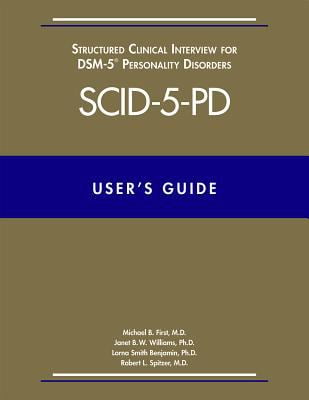

In addition, a dimensional scoring component has been added to the SCID-5-PD. Although the DSM-IV Personality Disorder criteria are unchanged in DSM-5, the SCID-5-PD interview questions have been thoroughly reviewed and revised to optimally capture the construct embodied in the diagnostic criteria. The SCID-5-PD name reflects the elimination of the multiaxial system in DSM-5.

The SCID-5-PD is the updated version of the former Structured Clinical Interview for DSM-IV Axis II Personality Disorders (SCID-II). The indispensable User's Guide for the SCID-5-PD is also available. The SCID-5-PD includes the Structured Clinical Interview for DSM-5(R) Screening Personality Questionnaire (SCID-5-SPQ), a handy self-report screening questionnaire for patients or subjects. Designed to build rapport, the SCID-5-PD can be used to make Personality Disorder diagnoses, either categorically (present or absent) or dimensionally. The Structured Clinical Interview for DSM-5(R) Personality Disorders (SCID-5-PD) is a semistructured diagnostic interview for clinicians and researchers to assess the 10 DSM-5 Personality Disorders across Clusters A, B, and C, as well as Other Specified Personality Disorder. It will guide the clinician step by step through diagnostic decisions using the DSM-5 criteria, which are included in an abridged format. A unique and valuable tool, the SCID-5-CV is used to assess and record DSM-5 diagnostic decisions. Screening questions are provided for the diagnoses that are included in their entirety in SCID-5-RV but have been left out of the SCID-5-CV. Despite the ""clinician"" designation, the SCID-5-CV can be used in research settings as long as the disorders of particular interest to the researcher are among those included in the SCID-5-CV. The SCID-5-CV is an abridged and reformatted version of the SCID-5-RV for use by clinicians that covers the diagnoses most commonly seen in clinical settings. Through repeated administrations of the SCID, students will become familiar with the DSM-5 criteria and at the same time will incorporate useful questions into their own interviewing repertoire.

For example, the SCID can provide trainees with a repertoire of useful questions to elicit information from a patient as the basis for making diagnostic judgments. For example, the diagnostic data that have been obtained using the SCID interview can be utilized by researchers, practitioners, policy makers, and the general public that are interested in prevalence and incidence estimates of psychiatric disorders among certain populations (e.g., depression in patients with diabetes).- To improve interviewing skills of students in the mental health professions, including psychiatry, psychology, psychiatric social work, and psychiatric nursing. To characterize a study population in terms of current psychiatric diagnoses. For example, the SCID is often used in clinical intake procedures or in comprehensive forensic diagnostic evaluation. The SCID-5-CV comes in a set of five one-time-use booklets.The SCID-5-CV can be used: - To ensure that all of the major DSM-5 diagnoses are systematically evaluated in adults.
SCID DSM 5 PROFESSIONAL
It is administered by a clinician or a trained mental health professional that is familiar with DSM-5 classification and diagnostic criteria. The Structured Clinical Interview for DSM-5, Clinician Version (SCID-5-CV), is a semi-structured interview guide for making DSM-5 diagnoses.


 0 kommentar(er)
0 kommentar(er)
